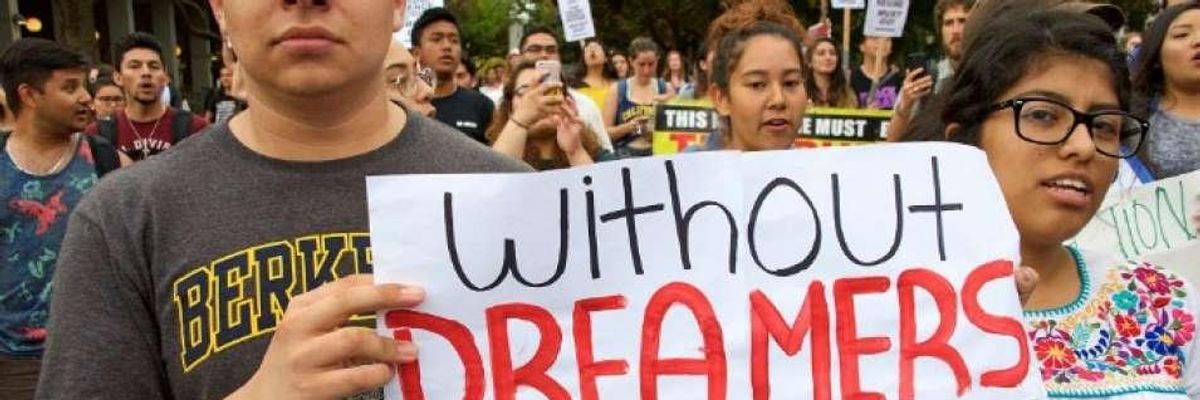In her important op-ed for the New York Times on August 13, 2019, a DACA recipient (Dreamer) named Tawheeda Wahabzada, whose Afghan parents had earlier sought refuge in Canada but then came over to the U.S., declares that she is no longer willing to wait for our country's legislative bodies to do something to help people like her out of the perpetual limbo, and that she'd rather "self-deport" back to Canada, the country of her birth.
She's 29 already, and there's no end in sight to her existential crisis, which she now finds intolerable. Should she wait another 5 or 10 years to get a driver's license, to pay taxes, to rent a place, to do all the things a citizen takes for granted as part of normal life? Should she continue to put her life on indefinite hold? Or should she accede to the demand made by white xenophobes, led by Donald Trump and his repulsive lieutenants like Stephen Miller, Julie Kirchner, and Kris Kobach, and cease to be part of this nation's fabric?
Her decision is all the more fraught with sadness for her because she is a model of the American Dream judged on its own terms, according to scholastic, cultural, and political accomplishments; and yet, there is no path to legality open to her, and no conceivable hope on the horizon that one might reveal itself.
I completely sympathize with her decision. Wahabzada is able to return to Canada, a country much better off than ours in numerous respects (as many of the commenters to her op-ed have noted), though if she were to have to return to Afghanistan, just about the most challenging country one might imagine for someone of her background, I would be even more supportive.
And yet, despite my strong belief in open borders around the world, and despite all my sympathies lying with every kind of migrant (I don't make the false distinction between legal and illegal, because our bureaucracy doesn't function in a way to allow for such an unsustainable differentiation), I would rather that Wahabzada not stay here. Though it is always difficult to leave a country one has gotten used to, I believe she'd be better off exiting this schlock-spectacle of a collapsing empire and whatever unspeakable misfortunes are to befall it over the coming decades.
The Democrats, during Barack Obama's presidency, executed a quintessential neoliberal ploy. Instead of a universal law helping every immigrant, they divided according to qualifications that were ever-shifting and subject to interpretation, which meant breeding more chaos into the system, all very much by design. And now, with Trump, even the dream of an attenuated Dreamer-oriented law, as Wahabzada clearly recognizes, is dead.
Between the lines of Wahabzada's self-critical essay one can detect the funeral notes of an American exceptionalism she no longer believes in--and rightly so. The problem Wahabzada identifies far exceeds that of Dreamers: it affects every migrant to some degree or another, in this post-enlightenment phase of the American immigration ritual, torn apart by an obscene respect for wealth and slavish obedience, rather than independence of spirit. A reverse brain drain has already been going on for some fifteen years, not only in the direction of Canada and Europe, but more remote countries of origin as well--a very welcome development. One hears again and again from Dreamers, despite the Democrats' vulgar separation between them and their parents and families, that they'd rather not take the humiliating deal which saves them but sacrifices their parents.
But the emotional purge must extend beyond any political party's dereliction. In post-liberal America, failure is often defined as success and vice versa. Wahabzada holds a master's degree in global policy studies from the LBJ school at UT-Austin, and the nonprofit she has worked for, Open Data Watch, which helps countries manage and improve official statistics, contains in its very name the contradiction of relying on quantification, once the enemy of individualism, to help accomplish nonquantifiable goals.
Education is supposed to empower, but it actually impoverishes. Can helping others be accomplished by data-driven enterprises mired in all the parochialisms of contemporary social science? How can we measure the value of an individual teaching a poor child in Afghanistan or Pakistan, compared to the technocratic frenzy of hyperaccomplishment American students are programmed to pursue in order to gain the official imprimatur of virtue?
The ironies, for Wahabzada and others like her, don't stop there. How does one fight for freedom by locating oneself in the headquarters of the worst human rights violator for the last seventy years? This includes Afghanistan, which was serially devastated after not one but two prolonged U.S.-sponsored wars. The American empire, pretending as always to be looking out for human rights and venturing "accidentally" into unfortunate misadventures costing innocent colonial lives, is defiled by the same hypocrisy at its core as the American Dream, which is the hollowest known interpretation of what constitutes human happiness. It is not that the American Dream needs to be pursued elsewhere, but that the American Dream is itself at fault. Its realization signals capitulation, whereas having to face continual obstacles might signify residual humanity in the aspirant.
Nonetheless, I applaud Wahabzada for what I hope are her first steps toward liberation, and I wish there were more like her. I wish youth, when it has its chances, would always have the foresight to reframe a problem of contingency as one of opportunity. America is not the only claimant to the dream anymore. It is not even one of the last ones. For many, the dream has become a nightmare, but there is yet a passage through the difficult terrain which might perhaps take us to a different kind of dream, because this one sure is extinct. It is a great step forward to recognize this and move ahead. That is the last best hope of mankind.

